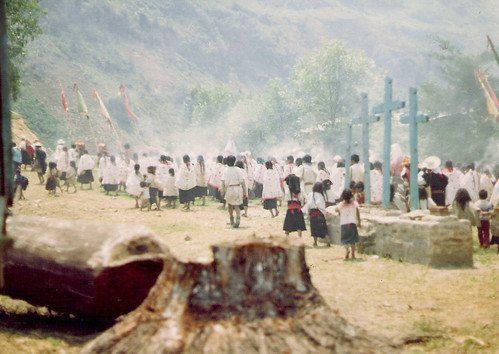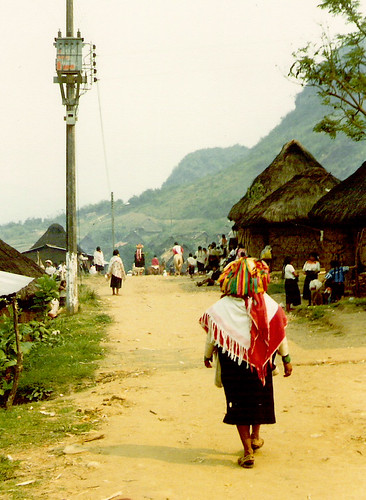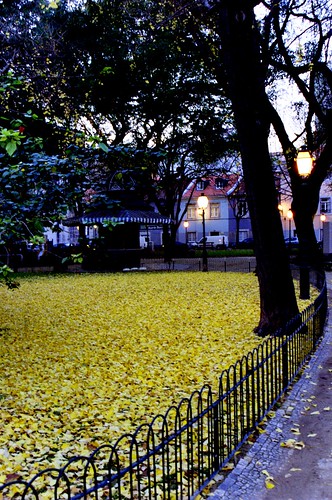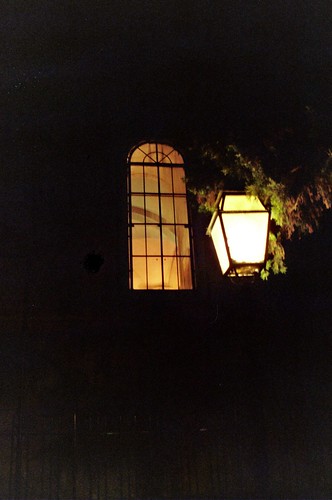Tuesday, January 30, 2007
Sunday, January 28, 2007
Saturday, January 27, 2007
Thursday, January 25, 2007
Monday, January 22, 2007
Each soul must meet the morning sun, the new sweet earth
and the Great Silence alone!
- Ohiyesa (Dr. Charles A. Eastman) -
Santee Sioux
and the Great Silence alone!
- Ohiyesa (Dr. Charles A. Eastman) -
Santee Sioux
Sunday, January 21, 2007
Saturday, January 20, 2007
Thursday, January 18, 2007
Antes que seja tarde !!
Portugal was the first european country to abolish the death penalty, in 1867.
this is from 1996 .....
Before it is late !!
THE ABOLITION OF THE DEATH PENALTY
1st of July 1996
129 years since the death penalty was abolished
(Law of the 1st of July 1867)
On the 1st of July, the Attorney-General took part in "Antes que seja tarde", on Antena 1. During this radio programme the anniversary of the abolition of the death penalty was commemorated.
Historical summary
At the session of the Chamber of Deputies held on the 10th of March 1852, the abolition of the death penalty for political crimes was proposed as a Supplement to the "Acto Adicional à Carta Constitucional". Discussion began on the 29th of March, and the only disagreements were about the legislative process to be followed. A representative of the government summarised the Chamber's apparently unanimous feelings about the main issue: "...because happily the death penalty for political crimes is abolished in all our hearts; if it happened that a Nero or a Caligula were to appear among us, they would be unable to impose it; fortunately we give the world an example of tolerance that greatly honours us".
The proposal was approved, and the abolition of the death penalty for political crimes became article 16 of the "Acto Adicional à Carta Constitucional" (5th of July 1852).
No capital punishment for a political crime has been carried out since 1834. Subsequently, the question of the abolition of the death penalty for other crimes was raised various times in Parliament.
At a session held on the 3rd of July 1863 Ayres de Gouveia initially suggested that the office of executioner should be removed from the budget of the state. Then he proposed the abolition of the death penalty for all crimes, including military crimes. The proposal was well received, seconded, and signed by various deputies. The text read:
"1st - The death penalty is abolished;
2nd - The dreadful office of executioner is extinguished;
3rd - The sum of 49$200 réis for the executioner is removed from the budget of the state".
That year and the next year it was not possible to obtain consensus for the proposal. In 1867, however, a law was passed that abolished the death penalty for all crimes except military crimes
- the Law of the 1st of July 1867.
For offences against military law the death penalty remained, until, on the 16th of March 1911, a Decree-Law abolished it. The Constitution of 1911 had forbidden such penalties in all cases.
A few years later, Portugal's participation in the 1st World War led to Law 635 of the 28th of September 1916. This re-introduced the death penalty "in the case of war with a foreign country, and only if the application of this penalty is essential, and exclusively in the war zone".
With a slightly different wording, this situation continued until the 1976 Constitution. In part 2 of Article 24 this Constitution established that "in no circumstances will there be a death penalty".
The movement for abolition was stimulated by provisions introduced in judicial laws (Reforma Judiciária, Nova Reforma Judiciária, and Novíssima Reforma Judiciária). These laid down that there would always be an appeal for clemency when a Portuguese court passed a death sentence.
The last death sentence for civil offences was carried out in Lagos in April 1846.
The date of the last execution of a woman was, curiously, the 1st of July 1772. Her name was Luísa de Jesus, she was 22 years old, and had murdered 33 abandoned children. These had been collected by her, sometimes using an assumed name, at the Coimbra foundling hospital, her objective being to enrich herself with the set of clothes and 600 réis that came with each child.
The last person executed for a military crime was a soldier of the Portuguese Expeditionary Corps in France, found guilty of spying. Portugal has been a pioneer in the abolition of the death penalty, and in renouncing its use even before it was formally abolished.
In 1967, at the international colloquium held in Coimbra to commemorate the centenary of the abolition of the death penalty. Miguel Torga and Vergílio Ferreira spoke:
Miguel Torga:
"The tragedy of man, 'a postponed dead body' as Fernando Pessoa said, does not need an untimely exit from the stage. It is tense enough without an end that is artificial and planned by butchers, megalomaniacs, potentates, racisms, and orthodoxies. Therefore, being human, we demand unequivocally that all peoples should have a code of humanity. A code that for all citizens guarantees the right to die their own death".
Vergílio Ferreira:
"...And by chance the criminal could not achieve the emancipation that he does not have? To suppress him is suppression of the possibility that the positive consciously establish itself in him. To suppress him is suppression of the Universe that can establish itself there, because if our "I" closes a circle on everything that exists, our death is effectively, after corpses, the death of the universe".
excerpt © 1997 - Office of the Attorney-General
this is from 1996 .....
Before it is late !!
THE ABOLITION OF THE DEATH PENALTY
1st of July 1996
129 years since the death penalty was abolished
(Law of the 1st of July 1867)
On the 1st of July, the Attorney-General took part in "Antes que seja tarde", on Antena 1. During this radio programme the anniversary of the abolition of the death penalty was commemorated.
Historical summary
At the session of the Chamber of Deputies held on the 10th of March 1852, the abolition of the death penalty for political crimes was proposed as a Supplement to the "Acto Adicional à Carta Constitucional". Discussion began on the 29th of March, and the only disagreements were about the legislative process to be followed. A representative of the government summarised the Chamber's apparently unanimous feelings about the main issue: "...because happily the death penalty for political crimes is abolished in all our hearts; if it happened that a Nero or a Caligula were to appear among us, they would be unable to impose it; fortunately we give the world an example of tolerance that greatly honours us".
The proposal was approved, and the abolition of the death penalty for political crimes became article 16 of the "Acto Adicional à Carta Constitucional" (5th of July 1852).
No capital punishment for a political crime has been carried out since 1834. Subsequently, the question of the abolition of the death penalty for other crimes was raised various times in Parliament.
At a session held on the 3rd of July 1863 Ayres de Gouveia initially suggested that the office of executioner should be removed from the budget of the state. Then he proposed the abolition of the death penalty for all crimes, including military crimes. The proposal was well received, seconded, and signed by various deputies. The text read:
"1st - The death penalty is abolished;
2nd - The dreadful office of executioner is extinguished;
3rd - The sum of 49$200 réis for the executioner is removed from the budget of the state".
That year and the next year it was not possible to obtain consensus for the proposal. In 1867, however, a law was passed that abolished the death penalty for all crimes except military crimes
- the Law of the 1st of July 1867.
For offences against military law the death penalty remained, until, on the 16th of March 1911, a Decree-Law abolished it. The Constitution of 1911 had forbidden such penalties in all cases.
A few years later, Portugal's participation in the 1st World War led to Law 635 of the 28th of September 1916. This re-introduced the death penalty "in the case of war with a foreign country, and only if the application of this penalty is essential, and exclusively in the war zone".
With a slightly different wording, this situation continued until the 1976 Constitution. In part 2 of Article 24 this Constitution established that "in no circumstances will there be a death penalty".
The movement for abolition was stimulated by provisions introduced in judicial laws (Reforma Judiciária, Nova Reforma Judiciária, and Novíssima Reforma Judiciária). These laid down that there would always be an appeal for clemency when a Portuguese court passed a death sentence.
The last death sentence for civil offences was carried out in Lagos in April 1846.
The date of the last execution of a woman was, curiously, the 1st of July 1772. Her name was Luísa de Jesus, she was 22 years old, and had murdered 33 abandoned children. These had been collected by her, sometimes using an assumed name, at the Coimbra foundling hospital, her objective being to enrich herself with the set of clothes and 600 réis that came with each child.
The last person executed for a military crime was a soldier of the Portuguese Expeditionary Corps in France, found guilty of spying. Portugal has been a pioneer in the abolition of the death penalty, and in renouncing its use even before it was formally abolished.
In 1967, at the international colloquium held in Coimbra to commemorate the centenary of the abolition of the death penalty. Miguel Torga and Vergílio Ferreira spoke:
Miguel Torga:
"The tragedy of man, 'a postponed dead body' as Fernando Pessoa said, does not need an untimely exit from the stage. It is tense enough without an end that is artificial and planned by butchers, megalomaniacs, potentates, racisms, and orthodoxies. Therefore, being human, we demand unequivocally that all peoples should have a code of humanity. A code that for all citizens guarantees the right to die their own death".
Vergílio Ferreira:
"...And by chance the criminal could not achieve the emancipation that he does not have? To suppress him is suppression of the possibility that the positive consciously establish itself in him. To suppress him is suppression of the Universe that can establish itself there, because if our "I" closes a circle on everything that exists, our death is effectively, after corpses, the death of the universe".
excerpt © 1997 - Office of the Attorney-General
Monday, January 15, 2007
Ya Basta
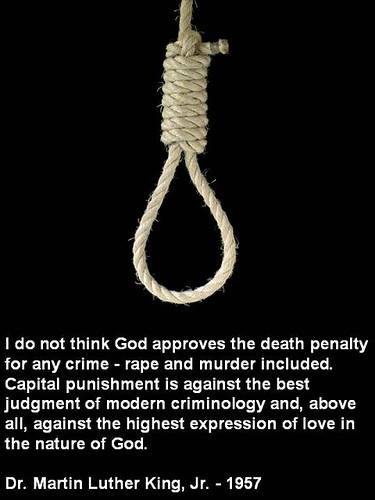
© luisa brehm
today was in Iraq .....
and after tomorrow it goes on in USA
- scheduled executions January 2007
9 - Corey Hamilton - murdered by the state of Oklahoma
10 - Carlos Granados - murdered by the state of Texas
17 - Johnathan Moore - murdered by the state of Texas
19 - Norman Timberlake - Indiana (stayed)
23 - Kenneth Biros - Ohio (stayed)
24 - Larry Swearingen - Texas (stayed)
25 - Ronald Chambers - Texas (stayed)
26 - Marcus Robinson - North Carolina (stayed)
30 - Christopher Swift - murdered by the state of Texas (volunteer)
and all over the World, who knows ???
please be alert and ACT !!!
Kill Death Penalty NOW !!!
Saturday, January 13, 2007
Laws for Creations,
For strong artists and leaders--for fresh broods of teachers, and perfect literats for America,
For noble savans, and coming musicians.
All must have reference to the ensemble of the world,
and the compact truth of the world;
There shall be no subject too pronounced--All works shall illustrate the divine law of indirections.
What do you suppose Creation is?
What do you suppose will satisfy the Soul, except to walk free and own no superior?
What do you suppose I would intimate to you in a hundred ways, but that man or woman is as good as God?
And that there is no God any more divine than Yourself?
And that that is what the oldest and newest myths finally mean?
And that you or any one must approach Creations
through such laws?
- Walt Whitman -
For strong artists and leaders--for fresh broods of teachers, and perfect literats for America,
For noble savans, and coming musicians.
All must have reference to the ensemble of the world,
and the compact truth of the world;
There shall be no subject too pronounced--All works shall illustrate the divine law of indirections.
What do you suppose Creation is?
What do you suppose will satisfy the Soul, except to walk free and own no superior?
What do you suppose I would intimate to you in a hundred ways, but that man or woman is as good as God?
And that there is no God any more divine than Yourself?
And that that is what the oldest and newest myths finally mean?
And that you or any one must approach Creations
through such laws?
- Walt Whitman -
Labels: Walt Whitman
Friday, January 12, 2007
Wednesday, January 10, 2007
Tuesday, January 09, 2007
Someday perhaps the inner light will shine forth from us,
and then we'll need no other light.
- Goethe -
and then we'll need no other light.
- Goethe -
Saturday, January 06, 2007
last lights

today is the last day of lights .....
in many senses, of course, this season is over
and a new dark one begins next sunday .....
today is my brother João' birthday,
so, this shot is too to celebrate life ;-)))))))
with hope in the future, Always !!!
Adorooooooooooo-te !!!
Happyyyyyyyyyyyyyyy Birthday !!!!!!
© luisa brehm
Wednesday, January 03, 2007
Protest
To sin by silence, when we should protest,
Makes cowards out of men. The human race
Has climbed on protest. Had no voice been raised
Against injustice, ignorance, and lust,
The inquisition yet would serve the law,
And guillotines decide our least disputes.
The few who dare, must speak and speak again
To right the wrongs of many. Speech, thank God,
No vested power in this great day and land
Can gag or throttle. Press and voice may cry
Loud disapproval of existing ills;
May criticise oppression and condemn
The lawlessness of wealth-protecting laws
That let the children and childbearers toil
To purchase ease for idle millionaires.
Therefore I do protest against the boast
Of independence in this mighty land.
Call no chain strong, which holds one rusted link.
Call no land free, that holds one fettered slave.
Until the manacled slim wrists of babes
Are loosed to toss in childish sport and glee,
Until the mother bears no burden, save
The precious one beneath her heart, until
God’s soil is rescued from the clutch of greed
And given back to labor, let no man
Call this the land of freedom.
- Ella Wheeler Wilcox -
To sin by silence, when we should protest,
Makes cowards out of men. The human race
Has climbed on protest. Had no voice been raised
Against injustice, ignorance, and lust,
The inquisition yet would serve the law,
And guillotines decide our least disputes.
The few who dare, must speak and speak again
To right the wrongs of many. Speech, thank God,
No vested power in this great day and land
Can gag or throttle. Press and voice may cry
Loud disapproval of existing ills;
May criticise oppression and condemn
The lawlessness of wealth-protecting laws
That let the children and childbearers toil
To purchase ease for idle millionaires.
Therefore I do protest against the boast
Of independence in this mighty land.
Call no chain strong, which holds one rusted link.
Call no land free, that holds one fettered slave.
Until the manacled slim wrists of babes
Are loosed to toss in childish sport and glee,
Until the mother bears no burden, save
The precious one beneath her heart, until
God’s soil is rescued from the clutch of greed
And given back to labor, let no man
Call this the land of freedom.
- Ella Wheeler Wilcox -


